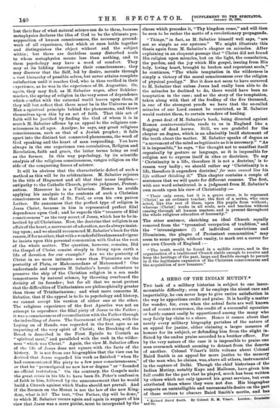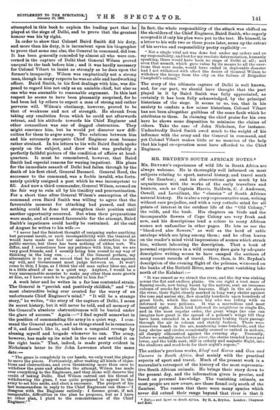A HERO OF THE INDIAN MUTINY.*
THE task of a military historian is subject to one insur- mountable difficulty; even if he employs the nicest care and impartiality, he can never hope to give entire satisfaction in the way he apportions credit and praise. It is hardly a matter for wonder, for, even when the actual facts are well known and of recent occurrence, the credit of a successful operation or battle cannot easily be apportioned among the many who may fairly lay claim to a share. Hence it comes about that nearly every military biography partakes of the nature of an appeal for justice, either claiming a larger measure of honour for its subject, or defending him from the slight in- flicted by the undue praise accorded to a brother officer. For by the very nature of the case it is impossible to praise one man overmuch without seeming to detract from the deserts of another. Colonel Vibart's little volume about Colonel Baird Smith is an appeal for more justice to the memory of the man who, he claims, was, above all others, instrumental in the capture of Delhi. Though the chief historians of the Indian Mutiny, notably Kaye and Malleson, have given him full credit for the part that he played, much has been written by others which not only ignored his great services, but even attributed them where they were not due. His biographer suspects an unintelligible and unreasonable desire on the part of these writers to obscure Baird Smith's merits, and has
• Richard Baird Smith. By Colonel H. H. Vibart. London: Constable and Co.
attempted in this book to explain the leading part that he played at the siege of Delhi, and to prove that the greatest honour was his by right.
In order to show that Colonel Baird Smith did his duty, and more than his duty, it is incumbent upon his biographer to prove that some one else, the General in command, did less. It has been generally conceded by almost all who were con- cerned in the capture of Delhi that General Wilson proved unequal to the task before him ; and it was hardly necessary for Colonel Vibart to insist as strongly as he does upon the former's incapacity. Wilson was emphatically not a strong man, though in many respects he was an able and hardworking officer. Baird Smith, in his first dealings with him, was dis- posed to regard him not only as an amiable chief, but also as one who was amenable to reasonable argument. In this last respect he seems to have been pleasantly surprised, for he had been led by others to expect a man of strong and rather perverse will. Wilson's obstinacy, however, proved to be that of weakness and not of strength. He shrunk from taking any resolution from which he could not afterwards retreat, and his attitude towards his Chief Engineer and other counsellors was one of dogged obstruction. They might convince him, but he would yet discover new diffi- culties for them to argue away. The relations between him and his extremely energetic Chief Engineer soon became rather strained. In his letters to his wife Baird Smith spoke openly on the subject, and drew what was probably a perfectly faithful picture of the condition of affairs at head- quarters. It must be remembered, however, that Baird Smith had especial reasons for waxing impatient. His plans for the immediate assault of Delhi had fallen through by the death of his first chief, General Barnard. General Reed, the successor to the command, was a feeble invalid, who fortu- nately quickly resigned a post which he was incompetent to fill. And now a third commander, General Wilson, seemed on the fair way to ruin all by his timidity and procrastination. For a short time after General Wilson's assumption of the command even Baird Smith was willing to agree that the favourable moment for attacking had passed, and that nothing could be done but strengthen their position until another opportunity occurred. But when their preparations were made, and all seemed favourable for the attempt, Baird Smith's impatience could hardly be restrained. At the end
of August he writes to his wife :—
"I never had the faintest thought of resigning under anything but personal insult, or such incompatibility with the General as would have made me feel our association obstructive to the public service, but there has been nothing of either sort. We differ, and I sometimes lose my patience with him, but we are very good friends, and I usually bring him round to my way of thinking in the long run If the General potters, my alternative is to put on record that he pottered clean against my will, and Government must judge between us. It won't come to this, I hope, as I think the old man rather likes me, and is a little afraid of me in a quiet way. Anyhow, I would be a very unreasonable monster to make any other than mere growls at him, as I have much to be grateful to him for."
A week later and he writes in a far less contented strain. The General is "peevish and positively childish," and "the most obstructive being ever created for the worry of an unfortunate Chief Engineer's mind." "It will be a strange story," he writes, "the story of the capture of Delhi, I mean its secret history, but it will never be told, and all memory of the General's absolute obstructiveness will be buried under the glare of success." Again :—" I find myself somewhat in the position of commanding the army in a quiet way. I com- mand the General anyhow, and as things stand he is conscious of it, and doesn't like it, and takes a congenial revenge by abusing myself and brigade whenever he can. The army, however, has made up its mind in the case and settled it on the right basis." That, indeed, is made pretty evident in Nicholson's letter to Sir John Lawrence about the same
date:—
" The game is completely in our hands, we only want the player to move the pieces. Fortunately, after making all kinds of objec- tions and obstructions, and even threatening more than once to withdraw the guns and abandon the attempt, Wilson has made over everything to the Engineers, and they alone will deserve the credit of taking Delhi. Had Wilson carried out his threat of withdrawing the guns, I was quite prepared to appeal to the army to set him aside, and elect a successor. The purport of his last memorandum in reply to the Chief Engineers ran thus= I disagree with the Engineer entirely : I foresee great, if not insuperable, difficulties in the plan he proposes, but as I have no other plan, I yield to the remonstrances of the Chief Engineer.". In fact, the whole responsibility of the attack was shifted on the shoulders of the Chief Engineer, Baird Smith, who eagerly accepted it if only his plan were put to the teat. He himself, in a letter to his wife two or three years later, sums up the extent of his service and responsibility pretty explicitly :— " Not a single vital act was done but under my orders and on my responsibility, and but for my resolute determination, humanly speaking, there would have been no siege of Delhi at all ; and even that assault, which gave value by its means to all the exer- tions that were made, would have ended in deplorable disaster had I not withstood with effect the desire of General Wilson to withdraw the troops from the city on the failure of Brigadier Campbell's column."
The story of the ultimate capture of Delhi is well known, and, for our part, we should have thought that the part played in it by Baird Smith was fully appreciated, as certainly it has been fully acknowledged, by the principal historians of the siege. It seems to us, too, that in his anxiety to confute a few minor historians, Colonel Vibart has not been altogether guiltless of the same fault which he attributes to them. In claiming the chief praise for his own hero he shows some disposition to minimise the claims of others. Take the case of John Nicholson, for instance. Undoubtedly Baird Smith owed much to the weight of his influence with the army and the General in command, and yet Colonel Vibart makes little or no mention of the help that his loyal co-operation must have afforded to the Chief Engineer.



















































 Previous page
Previous page